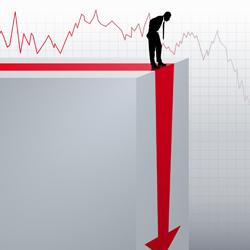Being a Thriving Business in a Bad Economy: 3 Critical Mistakes to Avoid in Crisis
 As the markets react to economic data, authoritative opinion and political manipulation, the individual can become confused and disoriented as to what would be the appropriate course of action. In a time when there seems to be a lot of fear and irrationality, the individual investor or business owner must rise above the noise and make rational and logical decisions that will ensure a more favorable outcome when the crisis is over.
As the markets react to economic data, authoritative opinion and political manipulation, the individual can become confused and disoriented as to what would be the appropriate course of action. In a time when there seems to be a lot of fear and irrationality, the individual investor or business owner must rise above the noise and make rational and logical decisions that will ensure a more favorable outcome when the crisis is over.
Critical mistake #1: Making short term changes to a long term plan.
Financial planning is the process of accumulating assets and following a well-ordered plan for managing those assets for the rest of your life and for the benefit of your survivors and charitable causes. Whenever the market is generally trending upward, it’s not particularly difficult to get people to invest for their future — it is, however, difficult to convince people to keep to a long-term strategy of continuing to invest on an ongoing basis. As the investment markets trend downward, which happens every few years, the long term plan easily gets abandoned in favor of the apocalypse du jour. Markets go in cycles. Your investment plan is a long-term process, and if we abandon that long term process due to short term gyrations of the markets, we will inevitably make the wrong decisions at the wrong time. Panic and fear have never been good emotions for making long term decisions.
Critical Mistake #2: Failing to understand the difference between volatility and loss.
Volatility is part and parcel of investing. All investments go up and down in value based on economic forces, and volatility is simply the increases and decreases of the current value of an investment. Loss is when you invest a certain amount of money and, when the investment program is complete, the amount you have is less than what you invested. If you are going to invest in the stock market for example, you have at least 10 years until you need the money to spend (if you need the money before that time, then you have no business investing in the stock market). During that 10 year plus period of time, the value of that investment will go up and down — perhaps quite a bit, depending on how aggressively you’ve invested. If that investment goes down during that period of time, IT IS NOT LOSS. It is volatility. The time frame of the investment has not been achieved yet. If a person cashes in that investment while it is temporarily down, then a loss will occur, because that person decided that that money was not for a long-term investment, but for a short term speculative bet. In other words, the worst mistake an investor can make is to cash in a long-term investment when the market is down. The correct action is to invest more. Yes, that’s right. If the investment was a fair deal at the value of 100, then it has to be a great deal when priced at 80! So, a true investor will disagree with all of the naysayers and invest anyway, knowing that the markets will eventually recover.
Critical Mistake #3: Failing to prosper during times of economic turmoil.
We cannot control what the markets will do or what Congress will do. But, we can control what we do as individuals and companies. When there is a recession, we must get more efficient in making money and expanding our businesses. That means we need to improve our marketing processes, promote more, create more sales, and improve the quality of our products. If the competition is the effect of the economy and chooses not to do the necessary work to improve their condition during times of economic turmoil, then they will emerge from the economic crises a smaller and less influential company. Don’t let this happen to you! Improve your marketing processes, promote like crazy, increase your sales and product quality, and you will make it through.
Making these 3 critical mistakes will always create a situation where the person has to work that much harder during times of economic expansion to make up the damage done during times of economic duress. It’s not what the economy is doing; it’s what you are doing in relation to the economy that makes all the difference. Know that when the economy expands, it will not expand forever, and when the economy contracts, it will not contract forever. Use this short time of contraction to better your position economically by investing in your business and your long-term financial plan.
P.Christopher Music is the President of Econologics Financial Advisors, a Registered Investment Advisor. He is a licensed life, health and annuity insurance agent, a certified business consultant and financial advisor who works with chiropractors and a variety of professional practices and small businesses. www.econologicsfinancialadvisors.com/.
He can be reached at 727-588-1540 or by e-mail at Christopher@waahome.com.
